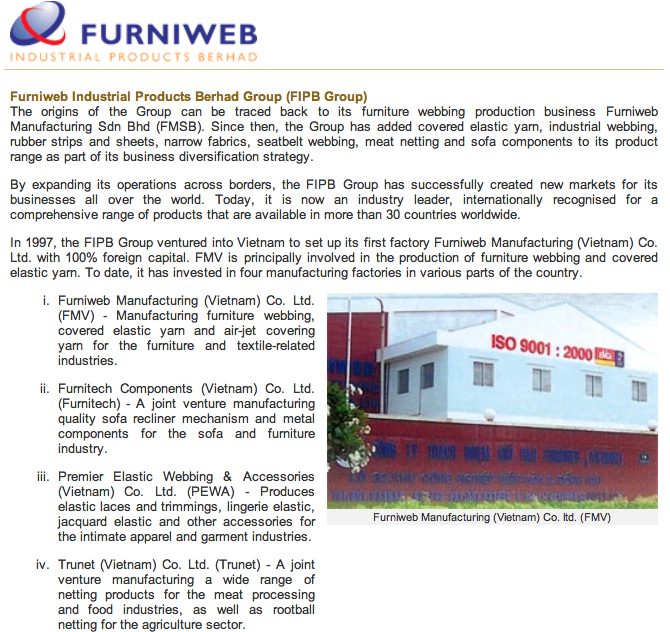Expertise Resource Association
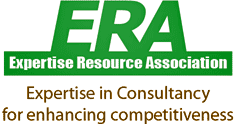
The Expertise Resource Association (ERA) was established in 1986 with the main objective to provide an opportunity for people who have retired from active service to deploy usefully their expertise and talents. ERA celebrated its 20th anniversary in 2005.
Membership to ERA is drawn from executives, scientists, engineers, technologists, lawyers, accountants, teachers and other professionals who are still alert, able and willing: willing to share their expertise to those who need it. Their combined experience and expertise are multi-disciplinary and multi-sectoral. A few of ERA members have contributed markedly to the economic development of the country and helped to provide input to shape Government policy.
ERA has reached out to many relevant public and private agencies, trade associations and others in its endeavour, both local and overseas, creating awareness of the functions of ERA and what it can offer. It has created important and strong links with the Ministry of Human Resource and the Small and Medium Industry Development Corporation (SMIDEC), an agency under the Ministry of International Trade and Industry.
Through these outreach efforts, ERA has been actively involved in many national and international programmes and activities. ERA members have participated in the Training Advisory Committee of SMIDEC, Investment Opportunities Project in Uganda for Asians and Value-addition seminar organized by the Myanmar Industries Association; appointed as consultants to various government agencies of some ASEAN countries and have been commissioned by UN bodies to conduct economic survey assignments in Asian and African countries.
ERA strongly believes that the programmes and activities will be beneficial to developing countries which are promoting more domestic and cross-border investments, increase exports of globally competitive products and services; on value-addition, supply chain management, quality and environment management systems, and market promotion. One of the main objectives of ERA is to be able to more effectively mobilize its members to provide consultancy services to all those who need them, in particular to assist the SMEs.
 ERA takes the following steps to conduct its consultancy services:
ERA takes the following steps to conduct its consultancy services:
- Establish contact between ERA & clients
- ERA & client ascertain expertise required
- ERA matches expertise from within or outside membership
- ERA dispatches experts to provide technical & management assistance through identifying problems and recommending solutions
- Prepare feasibility study report & proposal for clients for implementation
- Submit progress report and result of project
Basically, ERA operates on the principle of cost plus. For trade associations, chambers of commerce and industry, government agencies and non-profit oriented organizations, the clients need only to pay out-of-pocket expenses that cover flight and travel, hotel accommodation, and per diem to cover meals and allowances.
However, consultancy projects for profit-making private organizations, the fee will be as negotiated between the client and expert concerned.
More detailed information and the type of expertise offered by ERA can be obtained from the ERA website (era.my.diip.net)
Business Mission to Zambia – The Real Africa
MASSA and MIDA organized a mission to Zambia from March 7-12, 2007 as a follow-up to the Cross Border Investment Seminar on Zambia held in Kuala Lumpur. 17 participants from 11 organizations took part in the mission that covered Lusaka and Livingstone and was led by Tan Sri Dato’ Soong Siew Hoong, a member of MASSA’s Executive Committee. Dato’ J Jegathesan and his staff, together with JICA Zambia, coordinated and facilitated the mission.
The mission members had a tight programme. A seminar on ‘Doing Business with Zambia’ was held in Lusaka, concluding with individual business meetings among the Malaysian delegation and Zambian business people. Zambian Minister of Commerce, Trade and Industry, Hon. Kenneth Konga addressed the seminar, and highlighted the advantages of investing in Zambia, particularly as Zambia focused on private-sector led growth. The Zambian Government has instituted macro economic policies that are targeted at establishing an environment for increased domestic industrial growth, export promotion, development of market oriented production management and private sector development. Economic reforms include:
- Abolition of price controls
- Removal of exchange rate and bank interest rate controls
- Abolition of foreign currency controls in total
- 100% repatriation of net profits
- Privatization of state-owned enterprises
- Promotion and facilitation of both local and foreign direct investment
- Promotion of exports
- Development of the capital market through the Lusaka Stock Exchange
- Measures to diversify the economy from the traditional (copper and cobalt production) to non-traditional production and exports have been put in place
- Zambia has successfully reached the completion point of the Heavily Indebted Poor Countries (HIPC) Initiative and therefore have begun to benefit from bilateral and multilateral institutions. This augurs well and will put Zambia on track for development aid.
The policies and reforms had borne fruit in that Zambia had recorded an average economic growth of 5% and reduced rates of inflation and interest for the past three years. Foreign direct investment inflows into Zambia increased from US$72 million in 2001 to US$259 million in 2005, representing a 200% increase, showing that the country has a favorable investment climate.

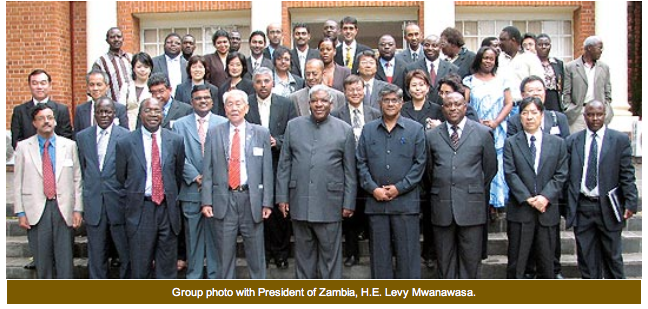
The mission members called upon the President of Zambia, H.E. Levy Mwanawasa, Minister of Commerce, Trade and Industry, Hon. Kenneth Konga and the Minister of Finance and National Planning, Hon. Ng’andu Peter Magande. In his speech, H.E. President of Zambia welcomed the Malaysian delegation, which was the first Malaysian Business delegation to Zambia and encouraged the setting up of Malaysian businesses in Zambia. Two Malaysian-Zambian joint venture projects were announced to the President, i.e. manufacturing of mobile phones and the setting up of a technical college in Zambia.
The Malaysian delegation was welcomed by the Mayor of Livingstone on arrival at the Livingstone Airport, and thereafter was taken to visit several potential sites for tourism development. The delegation was also treated to a leisurely two-hour sunset cruise on the Zambezi River on board the African Queen where delegates witnessed a spectacular sunset. The evening was concluded with a dinner hosted by the Livingstone business community at the Boma, an outdoor village-themed dining where a cultural performance was featured for the guests’ enjoyment.
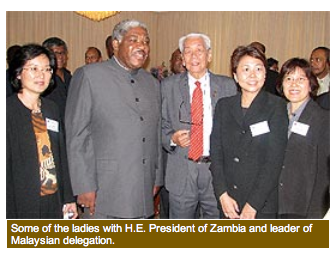 Zambia is one of the most liberalized economies in Africa with a decontrolled foreign exchange market, retention by investors of 100% profits and no controls on prices, production and dividend payments. The country, endowed with rich natural resources, is one of the most peaceful and stable countries in Africa with a low sovereign risk. As a member of both the Common Market For Eastern and Southern Africa (COMESA), and South Africa Development Community (SADC) regional economic trading blocks, Zambia is well positioned to take advantage of an easily accessible 450 million population market.
Zambia is one of the most liberalized economies in Africa with a decontrolled foreign exchange market, retention by investors of 100% profits and no controls on prices, production and dividend payments. The country, endowed with rich natural resources, is one of the most peaceful and stable countries in Africa with a low sovereign risk. As a member of both the Common Market For Eastern and Southern Africa (COMESA), and South Africa Development Community (SADC) regional economic trading blocks, Zambia is well positioned to take advantage of an easily accessible 450 million population market.
Zambian Key Macroeconomic Indicators
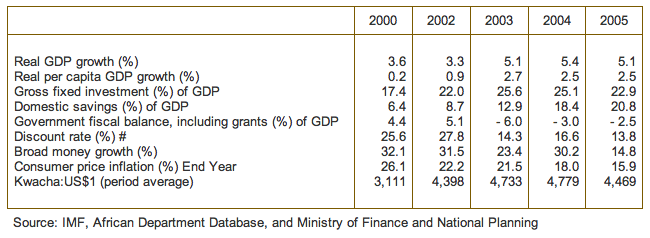
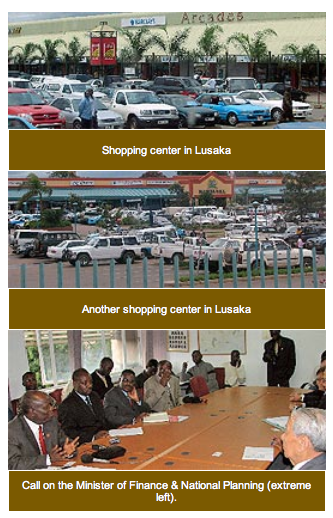 Priority sectors for investments include agriculture, tourism, mining, manufacturing and energy. Two-thirds of Zambia has medium to high potential for agriculture production, with only 15% currently under cultivation with maize, wheat, groundnuts, sugar cane, coffee, cotton, tobacco fresh vegetables and flowers. The country is well supplied with rivers and lakes, having 45% of southern Africa’s water resources. There is also great potential for aquaculture.
Priority sectors for investments include agriculture, tourism, mining, manufacturing and energy. Two-thirds of Zambia has medium to high potential for agriculture production, with only 15% currently under cultivation with maize, wheat, groundnuts, sugar cane, coffee, cotton, tobacco fresh vegetables and flowers. The country is well supplied with rivers and lakes, having 45% of southern Africa’s water resources. There is also great potential for aquaculture.
Mining in Zambia are mainly for copper and cobalt as there are huge reserves of these two minerals in Zambia. Zambia also has a variety of precious and semi-precious gemstones of which emeralds account for 20% of the world’s supply. There are also coal, feldspar, marble, silica, fluorite, graphite, tantalite, lime, gold and silver.
Zambia has abundant energy resources particularly hydropower. The industry and manufacturing sector in Zambia is driven by agro-processing, textiles and leather subsectors. Other activities include smelting and refining of copper and other metal products, production of fertilizers, chemicals, construction materials and cement. The Zambian Government has identified textile, wood processing, metal and engineering works and vehicle assembly as key subsectors for manufacturing.
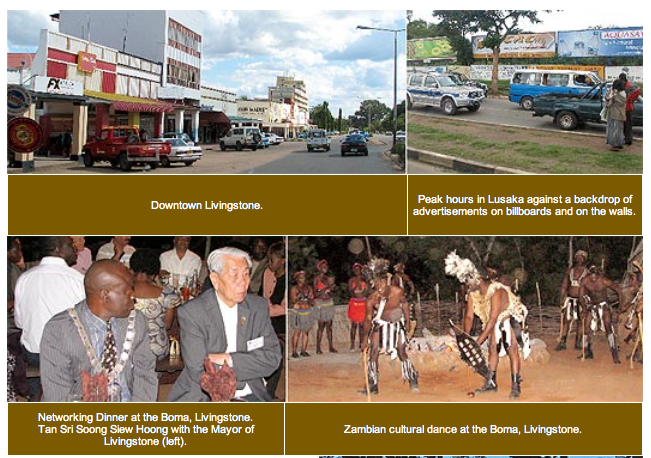
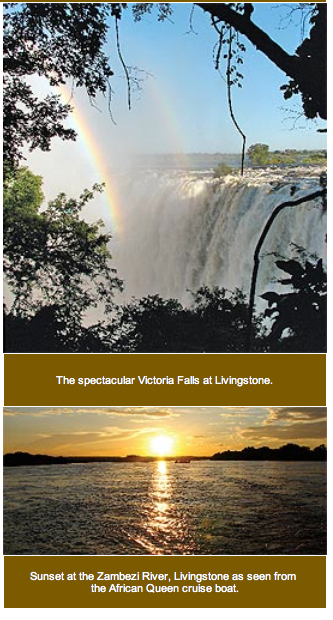 Zambia has a lot to offer in the tourism sector, with 34 game parks and 19 game management parks, of which only a few are developed. Investors are invited to exploit the country’s vast game reserves, stunning scenery and rich cultural heritage. In 2004, Zambia was named one of the top 10 world tourist destinations by the British Trends and Spends Survey while South Africa and Zambia were rated the top two tourist destinations in Africa. Known as the “Land of Magnificent Waterfalls”, Zambia shares the famous Victoria Falls with neighboring Zimbabwe, and is one of the seven natural wonders of the world. The Falls is fed by the mighty Zambezi River, and has created an adrenaline-pumping playground for world class white water rafting, river boarding, kayaking, gorge swinging and abseiling.
Zambia has a lot to offer in the tourism sector, with 34 game parks and 19 game management parks, of which only a few are developed. Investors are invited to exploit the country’s vast game reserves, stunning scenery and rich cultural heritage. In 2004, Zambia was named one of the top 10 world tourist destinations by the British Trends and Spends Survey while South Africa and Zambia were rated the top two tourist destinations in Africa. Known as the “Land of Magnificent Waterfalls”, Zambia shares the famous Victoria Falls with neighboring Zimbabwe, and is one of the seven natural wonders of the world. The Falls is fed by the mighty Zambezi River, and has created an adrenaline-pumping playground for world class white water rafting, river boarding, kayaking, gorge swinging and abseiling.
Zambian businessmen have expressed interest to establish collaboration in the following areas:
- Agriculture Ð cultivation of crops and subsequent value adding processes, post harvest
- Food processing
- Furniture manufacturing, furniture component manufacturing
- Logistics Ð transport vehicles
- Housing development
- Tourism facilities in Livingstone
MASSA will be the focal point to coordinate enquiries from Zambia and carry out post mission follow-up activities.
Useful websites:
Zambia Development Agency (ZDA) www.luse.co.zm
Zambia Association of Chambers of Commerce & Industry (ZACCI) www.zacci.org.zm
Zambia Association of Manufacturers (ZAM) odonnell@zamnet.zm
It’s Time To Invest In Mauritius
Mauritius offers an endless range of opportunities to Malaysian investors. The Government of Mauritius is fully committed to facilitate the flow of investments into the country by promoting opportunities in a wide range of priority sectors.
The island nation has a robust, diversified and stable economy, anchored on the agro industry, export-oriented manufacturing, tourism, financial services as well as the information and communication technology sectors. The Government has identified and developed these sectors to offer the highest growth potential to investors.
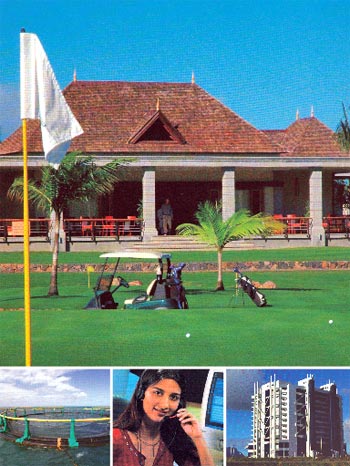 Hospitality and Real Estate Development
Hospitality and Real Estate Development
The enchanting beauty of the island and an investor-friendly business climate are the main factors behind the thriving performance of this sector in the Mauritian economy. Over the years, Mauritius has seen remarkable growth in the construction of beach resorts by international hotel groups.
Investment opportunities in this sector include the construction of beach resorts, business hotels and boutique hotels; entertainment and leisure activities, eco tourism, casinos; marina, beach and water-related attractions; real estate developments: residential, retail, commercial, industrial and lifestyle estates; and MICE (Meetings, Incentives, Conferences & Exhibitions).
Information and
Communication Technology
The ICT sector achieved a 38% growth in 2006 – an impressive performance which is expected to improve even more in the coming years. Within this sector, there are burgeoning opportunities for investors in value-added Business Process Outsourcing (BPO) activities in financial and accounting, hospitality and tourism, health and medical, human resources, legal; call and data-processing centres; disaster recovery and business continuity planning; and software development.
Seafood and Marine Industry
The strategic position of Mauritius in the Indian Ocean, one of the main fishing zones in the world, makes it the ideal location for the development of seafood and other marine-related activities. The country has a 1.9 million square km Exclusive Economic Zone that is abundant with seafood resources. The Mauritius Freeport provides sophisticated logistics services and excellent facilities for the storage of fresh, chilled and frozen products.
Investment opportunities include trans-shipment, tuna fishing (Mauritius has the second largest global tuna stock), seafood processing, auxiliary services and aquaculture with five lagoon-based sites already identified.
Land-based Oceanic Industry (LBOI)
Mauritius is well-positioned to tap the enormous economic values of the Great Conveyor Belt comprising deep seawater currents which carry centuries old seawater. LBOI activities include the desalination and bottling of water obtained from the Global Conveyor Belt, from a depth of 1,000 meters. This water is also used for the air conditioning in hotels, residences and commercial buildings. Opportunities also exist for the use of this water in the manufacturing of bio-medical and pharmaceutical products as well as in aquaculture for high value seafood products.
Bio-medical and Health Services Industry
Mauritius offers the Malaysian investor many interesting opportunities to provide medical services, facilities and treatment to local and international patients in a variety of specialty areas. The Government encourages investment in the setting up of multi-specialty medical centres, cosmetic surgery and dental clinics, diagnostic centres, convalescence centres, health and wellness centres as well as clinical centres.
Knowledge Industry
Mauritius has a dynamic programme in place to attract internationally renowned educational institutions, universities and training centres to establish off-campus branches, colleges and training centres on the island to cater to the regional and international student community.
Opportunities exist for investors to set up universities, subsidiary and off-campus branches of reputable universities, science and technology centres, business schools, research & development centres and other centres of excellence.
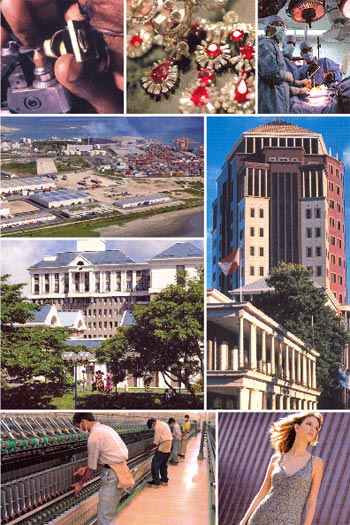 Media & Entertainment Industry
Media & Entertainment Industry
The Government of Mauritius has a vision for the country to become a regional film shooting and production centre. Therefore, many opportunities are available for investors in the setting up of production houses and film processing centres as well as in financing and distribution.
Financial Services
There are about 30,000 companies operating in this sector including multinationals, banks, non-bank financial intermediaries, trusts and insurers. In fact, 10% of the country’s GDP is attributed to the financial services sector. The Mauritius Stock Exchange is a member of the World Federation of Exchanges and is one of the fastest growing in the region.
The opportunities that exist in this sector are in private banking, trusts administration, management companies, global businesses, private equity and credit rating.
Textile & Fashion Industry
The textile & fashion industry has spearheaded economic growth in Mauritius for over 30 years. Today, the country is home to some of the most modern businesses in both cotton and woolen wear. Opportunities that would be ideal for Malaysian investors include cotton spinning, knitting and weaving mills; home textile miles; beach and swim-wear manufacturing; design & fashion centres and institutes; and buying offices for the Africa-Asia regions.
Logistics & Distribution
This sector revolves around the Mauritius Freeport, a commercial free zone that was created to diversify the economic base of Mauritius. It aims to offer a competitive logistics and distribution platform for international trade. Specialised logistics facilities and services are available for transshipment, consolidation, goods storage and value-added activities like processing and light assembly of goods.
Value-added Manufacturing and Light Processing
Mauritius has a skilled labour force that will meet the needs of value-added manufacturing activities such as jewellery and diamond cutting & polishing, the assembly of electronic products, the manufacture of medical devices and the assembly of computers.
Biotechnology
Mauritius has extensive experience and expertise in the agro industry, especially in research and development (MSIRI, AREU, etc.) and sector industrialization. With its strategic location, infrastructure and vast resources, Mauritius has all the makings of an advanced biotechnology centre for the region, with significant market access through COMESA and SADC.
For more information on investing in Mauritius, please log on to:
Discover Mauritius: www.mauritius.net/general_info/offices.php
Board of Investment Mauritius: www.boimauritius.com
Make Malaysia Your Second Home
The Malaysia My Second Home (MM2H) programme is an initiative of the Malaysian government to promote long-term stay in the country. Although initially introduced to encourage foreign citizens to be in Malaysia to escape their hot summers or cold winters, the programme is now also being actively promoted to entice foreign citizens to use Malaysia as a base:
– To conduct their business overseas
– To educate their children
– For retirement or semi-retirement
To make this programme even more attractive, application procedures and conditions have been reviewed to simplify procedures.
Incentives
- Renewable, multiple-entry social visit pass for ten years.
- Purchase of two units of residential properties priced at above RM250,000.00 each (US$73,529) without Foreign Investment Committee (FIC) approval.
- Tax exemption on import of personal car or purchase of locally-assembled car.
- Tax exemption on remittances from abroad.
- Provision to bring in a maid.
Successful participants, however, are not allowed to work or be employed while staying in Malaysia under
this programme.
Criteria
- The basic criteria would be to fulfill the following financial conditions through any bank in Malaysia:
– If aged below 50 years: RM300,000 (USD88,250) in Fixed Deposits.
– If aged 50 years and above: RM150,000 (USD44,120) in Fixed Deposits OR proof of offshore monthly
personal income of RM10,000 (USD2,950).
After a year, participants may withdraw part of the fixed deposit for house purchase, medical or for their children’s educational purposes. Participants are required to maintain a minimum balance of RM60,000 (USD17,647) from the second year onwards. However, they may choose to withdraw all their fixed deposits should they decide to terminate their participation in the programme. - A medical report from any private hospital or registered clinic in Malaysia is to be submitted and;
- A medical insurance policy is to be purchased.
Why Malaysia?
There are many reasons why Malaysia has become a favourite ‘second home’ destination. Many participants are attracted to its political stability and economic strength while others are drawn to its pleasant and warm tropical climate. For participants who prefer cooler surroundings, there are also highland residential areas and resorts with permanent spring-like weather throughout the country.

Warm & Friendly Malaysians
 One of the country’s most unique features is its rich diversity of cultures. The population of Malaysia totalled 26,920,000 as at December 2006. Malays (which make up 57% of the population), Chinese, Indians and other ethnic groups live harmoniously together and are free to practice their religions. Although Bahasa Malaysia is the national language, English is widely spoken throughout the country.
One of the country’s most unique features is its rich diversity of cultures. The population of Malaysia totalled 26,920,000 as at December 2006. Malays (which make up 57% of the population), Chinese, Indians and other ethnic groups live harmoniously together and are free to practice their religions. Although Bahasa Malaysia is the national language, English is widely spoken throughout the country.
Malaysia offers a comfortable living environment with the latest modern amenities, good healthcare and medical facilities, excellent educational institutions and world-class recreational & sports facilities.
Healthcare
Malaysia has about 35 private hospitals with UK-trained doctors and also doctors from Japan. These hospitals are all equipped with state-of-the-art equipment and facilities.
Education
There are over 30 international schools in Malaysia including American- and British-style international schools as well as French, German, Japanese and Taiwanese schools that have facilities for pre-school right through to college-level education. Additionally, twining programmes are offered by both local higher institutions and international universities/colleges.
Recreation
The country has many wonderful recreational spots for the family including theme parks like Genting Highlands and Sunway Lagoon as well as relaxing destinations like beach resorts and island getaways. Malaysia is also a paradise for golf enthusiasts with close to 200 courses designed by world-renowned names.
Low Cost Of Living
Many retirees from abroad will truly enjoy their retirement here under the MM2H Programme as the cost of living is relatively low. Some can expect to lead a more luxurious life especially if they come from developed countries with a stronger exchange rate. For example, a Japanese citizen will be able to enjoy three times the value of his savings if he was to retire in Malaysia.
Safety & Security
Malaysia places top priority on the law; administration of justice and undertakes continual vigilance on public security. Malaysia is regarded by many as one of the safest and least volatile democracies in the Asian region. Malaysia has been virtually free of any incidents of violence and terrorism.
CONTACT US NOW!
For more details or to download the application form, log on to http://mm2h.motour.gov.my
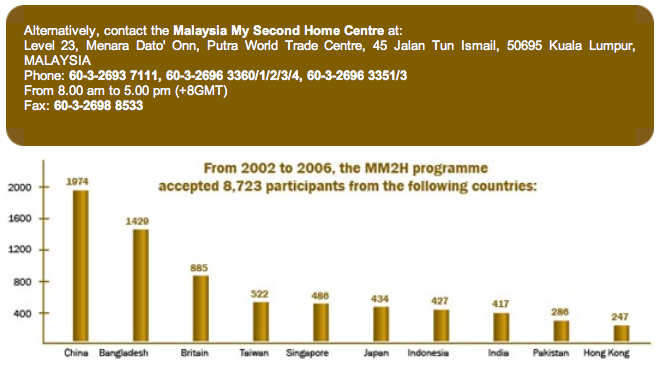
Market Development Grant (MDG)
The Market Development Grant (MDG) is the provision of matching grants to assist Malaysian SMEs to undertake promotional activities for the development of export markets. This is done by providing grants to partly defray the cost of promotional activities undertaken for this purpose.
Since 2002, a total of 1,238 SMEs have received assistance under the scheme including 639 SMEs in 2005. These SMEs reported export sales worth RM123.3 million and potential sales of RM262.7 million in 2005. For the period January 2002 to 21 March 2007, a total of 5,202 applications valued at RM43.81 million, from 1,784 SMEs, were approved. Sectoral breakdown shows that most of the companies were involved in Furniture (15.3%), Prepared Food (11.3%), Building & Construction Materials and Hardware (7.2%), Computer & Related Services (5.7%), and Machinery & Equipment (5.4%).
The majority of the SMEs participated in activities such as Overseas International Trade Fair (53.15%), Local International Trade Fair (20.13%), Preparation of Promotional Materials (14.13%) and Trade Mission (8.77%).
Companies can obtain a 50% reimbursable matching grant on the approved cost of the eligible activities. The grant is available for one or more of the eligible activities. The maximum limit of RM100,000 was abolished from 1 June 2006.
The following activities are eligible for the MDG:
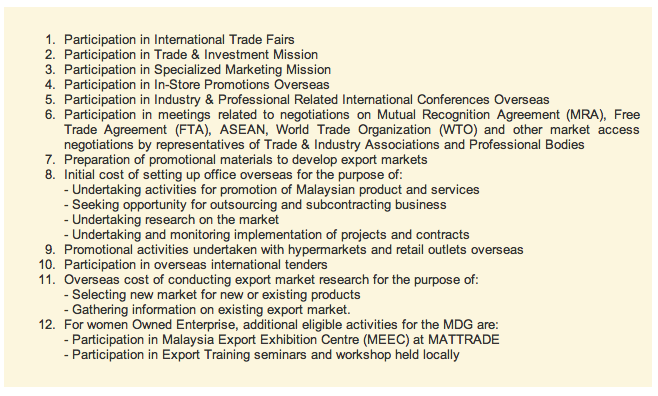
The following are the application and claim procedures for the MDG:
- Application for the grant is made using the application form MDG Rev 1/06 which is available free of charge from MATRADE or can be downloaded from the MATRADE’s website: www.matrade.gov.my/exportsupport/mdg.htm. All companies are encouraged to apply for the MDG at least one month before undertaking the activity. This is to ascertain if the activity is eligible for the grant.
- Claims for the reimbursement of all eligible activities must be submitted within 3 months of completion of the activity with the invoices and original receipts or their respective copies certified by External Auditors.
- Companies are required to provide application and claim supporting documents when applying for the grant as described in the MDG application form, and the checklist attached to the form. Companies are advise to submit all relevant document when applying for the MDG.

Editorial
The first quarter of 2007 has already come to past. Visit Malaysia Year 2007 is fast gaining momentum and MASSA is pleased to support this initiative of our Government. We feature an article on Malaysia My Second Home (MM2H) promoted by our Ministry of Tourism. This is a unique programme providing incentives for qualified visitors to live in our country on a long term basis.
MASSA, with the support of MIDA and JICA Zambia, organized a mission to Zambia in March 2007. A total of 17 members led by YBhg Tan Sri Dato’ Soong Siew Hoong visited Lusaka and Livingstone. The Government and business community warmly received the delegation. The hectic schedules of meetings with Government officials and business groups augur well for the enhancement of business linkages in yet another African nation.
MASSA’s next destination is Mongolia. Our President will be leading a business delegation to Mongolia from 26 to 29 June. We urge members to join us on this visit. The investment opportunities in mining, urban city development, amongst others, are among the focused areas.
Also featured in this newsletter, is an article on Market Development Grant (MDG) providing readers with the latest incentives under this government scheme. We encourage members to acquaint themselves with the criteria and to apply for this financial assistance facility as they undertake promotional activities to develop their respective export markets. The MDG coverage has been widened to include amongst others, costs of export market survey expenses and the setting-up of overseas offices to undertake promotion, outsourcing and subcontracting businesses. The maximum limit of RM100,000 grant per company was abolished last year.
In our next coming issues of the newsletter, we will be inviting members to do a corporate feature on their business. We want to provide this excellent avenue for members to promote themselves via our newsletter. Our newsletters can be found in our Malaysian Embassies and High Commissions abroad and all the Embassies and High Commissions of the developing countries are also recipients and through them, are relayed back to their respective business communities. Besides, we will also feature your organization on our website at www.massa.net.my. We encourage members to come forward and be featured.
We value member’s continuing active participation in our activities and also look forward to your suggestions to improve on our services.
Hamidah Tun Ghafar
Editor
President’s Message

The Malaysian economy achieved a steady growth in 2006, amidst improving macro-economic fundamentals, a strengthened financial sector and a more diversified economic structure. In spite of its open economy, Malaysia achieved a major milestone last year in the history of Malaysian’s external trade – Malaysian’s total trade breached the RM1 trillion value, exceeding previous year’s total trade by 10.5%. This trade growth comes on the back of increasingly positive economic data in recent months, coupled with more business friendly policies and development plans.
This trade growth has also highlighted the fact that trade with developing economies in Latin America, South Asia, Eastern Europe, ASEAN countries, West Asia and China have widened and deepened. Going forward, we should continue to build upon this growth momentum and strive for greater synergy and competitiveness to anchor Malaysian brands in these developing economies.
The Malaysian Government has continuously placed emphasis to develop a strong and dynamic SME sector. More than 90% of business establishments are SMEs. While they are a major source of employment, they have only contributed less than 20% to the total export value and less than 35% of GDP.
In view of this, the Government has embarked on major initiatives for SME development aimed at building capacities and capabilities, enhancing their access to financing and strengthening the enabling infrastructure to further support their growth.
MASSA is also committed to support this programme and it is our hope and call to SME establishments in Malaysia to avail themselves to the many programmes and initiatives of the Government and find a niche for their line of business, not only in Malaysia, but also in the developing countries of the South. Towards this end, our newsletter is committed to provide members and our readers with useful information for SMEs to move forward in their businesses.
On this note, I wish to thank Tan Sri Dato’ Soong Siew Hoong for contributing an article in this newsletter on why SMEs should undertake cross border businesses. His efforts to help our SMEs upgrade and improve themselves have been exemplary and today, his knowledge and services are much sought after in developing countries. We are pleased to welcome Tan Sri Soong on board our Committee.

TAN SRI DATO’ AZMAN HASHIM
President


